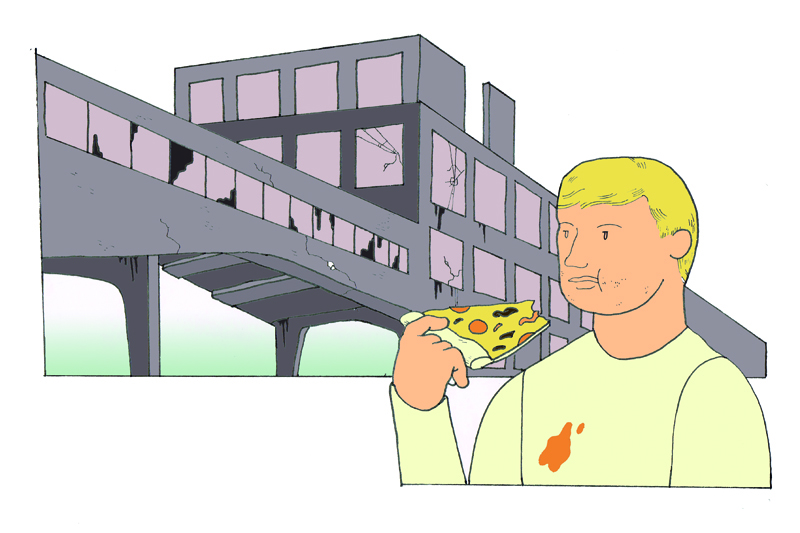Book author Léandre Larouche shares his short story, “Infrastructure”
The main street is walking down my body. I’ve been wandering around for too long now. Thanks to the downtown lights, I see the city’s true colours. I see the uncovered faces of churches, condos, skyscrapers and bridges; and the main street keeps walking down my body. I feel its heavy weight crash onto my soul. There’s something uncanny about being alone. It’s as if everything was more evident, more noteworthy. I notice how run-down our infrastructure is.
Simultaneous construction around the city is at an all-time high; it monopolizes the public space from the street level to the sky. Giant ladders stand still leaned up against building walls, while operating cranes and piles of materials occupy entire parking lots. Every corner, ostracized, finds itself hijacked by construction equipment. But at this time—it’s 11:30 p.m.—nothing’s going on, everything’s frozen. I see my city as a sad, grayish picture, one upon which I’m forced to lay my eyes, sad and bitter and resentful. I didn’t ask to see the city as it is. I didn’t ask to be alone tonight.
There are so many bars here, more than I thought. Never would I have expected to see so many of them, on just one street, although I know this city as no one else does. Nor would I have imagined so many people congregating inside them. My friends and I are of the most loyal, trustworthy regulars to the bars we cherish and call home; we never miss, at least not without a good reason, the rendezvous that has become tradition. We are earnest drinkers, fervent chatters and lovers of people; yet I was blissfully unaware that my city had so many choices.
Just to my left is a brewery I must have gone to a dozen times. As I walk by it, a group of men stand next to the door, smoking cigarettes, chatting and laughing loudly. These rather muscular guys, with beards and all, are clearly having a good time. I pass just in front of them, slow down and turn back. I shoot a glance inside the bar. I can see the people; I can feel the vibe. They walk and talk and drink in the laid-back atmosphere; the bar is half modern, half antique. I want to go in. I want to go in and sit down and have a drink. But I refrain and keep walking.
Further down the main street is another bar which I more or less know. I mean to enter that one too. The dim light at the entrance suggests a tiny ray of hope for me. I approach the door, stare at the doorman, and then decide to back off. This place isn’t for me, after all. I keep walking, paying more and more attention to bars and, as I remain in motion, I see plenty of them. I see plenty but they’re all full. As soon as I look in, if I dare do so, I don’t see any place for me to sneak in. The counters are unwelcoming and so are the tables. There’s no place where I might belong.
I accelerate my pace, throwing glances at bars I pass, and I don’t go in. I note each one’s crowdedness, biting my lips. Panic grows apace, my heart pounding, my head hurting and my mouth becoming dry. I grow dizzy and uncomfortable; I can’t see the surrounding light. After a while, I hit the end of the main street only to find myself faced with deep shame. There must be something wrong with me, I think. All the moments spent with friends in bars rush to my mind. Why am I so lonely? Why am I so abnormal? I thought I was someone.
The only place I can get into is a pizza place, empty and just about to close. Once inside, I sit down, slice in hand, and gaze at a condo building being demolished outside. They’re not done with it yet, but it already looks like a perfect wreck. I bite into my pizza and tomato sauce falls onto my shirt. The cashier is cleaning up behind me. It’s 11:59 p.m. now, and the dawn of a new day threatens me. In a minute, it will be Friday night no more, and I feel like a disappointed disappointment. I wonder what everyone might be doing right now. I sigh. My infrastructure isn’t any better than the city’s.
Graphic by Alexa Hawksworth
